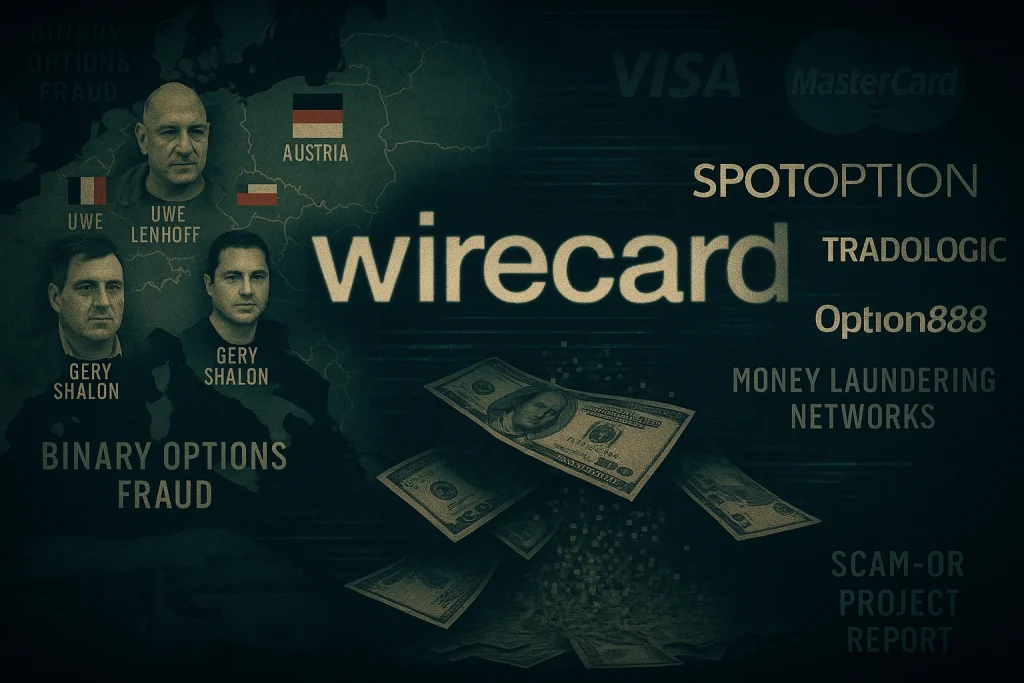The Scale of the Fraud
Since early 2018, the Scam-or Project has been actively reporting on illegal brokerage operations, particularly those involving binary options. According to the FBI, investors were defrauded of approximately $10 billion annually through binary options alone. While this product has since been outlawed in most regions, the period from 2010 to 2018 saw a massive surge in activity, leaving countless victims and financial losses reaching into the tens of billions. Legal proceedings are still unfolding across Europe. Legal analysts suggest that payment service providers (PSPs) supporting these schemes may be considered accomplices and held accountable under conspiracy and money laundering laws.
Wirecard’s Connection to Unauthorized Brokers
A Payment Partner to Illicit Operations
In the course of its investigations, the Scam-or Project identified several regulated PSPs that played a role in these illegal networks. Among the most prominent was Wirecard, a major German public company.
Wirecard appeared to have processed large volumes of illicit funds derived from unauthorized trading platforms — a textbook case of money laundering. This was particularly notable in the binary options sector, which flourished illegally for nearly a decade before regulators began cracking down and banning the product in many countries.
The Nature of Binary Options Scams
Approximately 99% of binary options firms functioned as “bucket shops” — essentially betting operations where clients wagered on the direction of asset prices without actual ownership or market participation. These entities acted similarly to casinos, with the broker always taking the other side of the trade. This model was inherently deceptive, prompting widespread bans.
Wirecard, acting as an acquirer for Visa and MasterCard, allowed these fraudulent operators into its merchant network. The Scam-or Project has confirmed Wirecard’s ties to at least two major binary options schemes through documentation provided by defrauded clients.
Key Players and Platform Providers
Wirecard’s Role in the Networks of Lenhoff and SpotOption
Wirecard was closely linked to two major illegal broker networks:
-
The Altair Entertainment network, run by the now-incarcerated German national Uwe Lenhoff.
-
The SpotOption ecosystem, the largest binary options platform provider, based in Israel.
SpotOption (OpenCorporates data) not only licensed its technology to dozens of fraudulent brokers but also ran its own scams under various names.
Examples of Brands Using SpotOption:
-
GlobalTrader365 (www.globaltrader365.com)
-
VaultOptions (www.vaultoptions.com)
-
VipBinary (www.vipbinary.com)
In 2016, the U.S. Commodities Futures Trading Commission (CFTC) filed a lawsuit against GlobalTrader365 and VaultOptions for operating illegally. This and other critical insights into the structure and operations of these fraudulent entities were made public by financial analyst Fraser Perring, who has been actively reporting on Wirecard and its connections to binary options fraud.
Other Involved Entities
-
Banc De Binary: Also tied to SpotOption and Wirecard. In 2013, it was charged by both the SEC and CFTC for violating U.S. financial regulations. The SEC obtained a preliminary injunction from the U.S. District Court for the District of Nevada to prevent and freeze any further trading with U.S. customers (source).
-
Yukom Communication: CEO Lee Elbaz and executives Lissa Mel, Liora Welles, and Shira Uzan were indicted for defrauding U.S. investors of tens of millions (link). They, too, operated on the SpotOption platform.
A Deeper Look: The Billion-Dollar Binary Industry
SpotOption’s Dominance
In 2016, SpotOption claimed its platform was used by two-thirds of all binary option brokers, with a total trading volume of around $5 billion annually. At its peak, 300 brands operated on its infrastructure. Founder Pinchas Peterkazishvilli (aka Pini Peter) had previously been convicted for money laundering, as reported by The Bureau of Investigative Journalism (report).
The Rise of Tradologic
The second-largest platform was Tradologic, used by 240 binary brokerages. It was also Israeli-run, with Gal Barak as a director and shareholder. Barak was later arrested in Bulgaria during a joint European enforcement operation. Gery Shalon, accused in the U.S. of financial crimes including illegal gambling and securities fraud, also invested in Tradologic. Another prominent figure was Vladislav Smirnov, a Russian hacker with a history of legal issues in the United States.
Using Tradologic, Uwe Lenhoff operated sites like Option888. He was also a shareholder via Lensing Management Services. Lenhoff was arrested in February 2019 alongside Gal Barak during coordinated international raids.
Wirecard’s Financial Infrastructure
Payment Routing and Aggregators
Wirecard was deeply embedded in these fraud networks, not just as a PSP but as a facilitator of the SpotOption payment ecosystem. It partnered with ChargeXP Investment Limited, which served around 300 white-label brokers associated with SpotOption. Together, they handled payments even in the Asian markets.
Case Examples:
-
60Trader (www.60trader.com)
-
SmartOptions
These brokers operated using bank wire instructions connected to Wirecard and ChargeXP.
Montenegro and Beyond: The Global Payment Web
Global Payment Solutions, a company in Montenegro, had Lenhoff and Gal Barak among its shareholders. Established in 2015, it involved partners from Serbia and Montenegro. The evidence shows a clear link between Wirecard’s German network and the Israeli-Tradologic ecosystem around Barak.
Final Note: Evolution from Gambling to Fraud
Uwe Lenhoff’s background in online gambling — a sector banned in the U.S. — laid the groundwork for his involvement in binary options. From this perspective, Wirecard’s entanglement in such schemes may appear less surprising and more as a natural extension of its prior dealings.
→ Read Wirecard & Binary Options – Part II to explore the continuing investigation and the deeper financial entanglements behind these operations.


